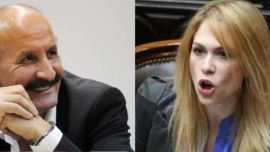As with a typical story of love and hate, the 60-year-old relationship between Argentina and the International Monetary Fund (IMF) has been marked by its ups – and its downs.
For many Argentines, the Fund is almost an offensive presence in the country, one more associated with recession or depression than growth.
"I must confess that with Christine [Lagarde] we started a great relationship a few months ago, one which I hope will work out very well and end with all of Argentina falling in love with Christine," enthused former president Mauricio Macri in September 2018, shortly after agreeing his historic US$57 billion stand-by agreement with the IMF.
His successor, Peronist leader Alberto Fernández, is not quite so keen. This week, the two sides began negotiating a delay to payments on that monster loan (of which US$44 billion has been delivered), until Argentina exits its recession and returns to economic growth.
"If we were to pay ... we would be plunging the economy into absolute despair. In order to pay, we have to grow first," said Fernández recently.
Recession agents
In terms of debt, Argentina is a record-breaker. In 2001, the nation recorded the largest default in its history, some US$100 billion, while in 2018, the loan agreed to by Lagarde was the highest ever granted in the Fund's history.
The IMF "has a very negative image because it is seen as responsible for the last two major crises [in Argentina]," in 2001 and 2018, Matías Rajnerman, an analyst with the Ecolatina consulting firm told AFP.
"The IMF loans aggravated the recessions instead of helping to get out of them," he added.
Argentina first became involved with the Fund in 1956, during the dictatorship led by General Pedro Aramburu (1955-1958).
On every occasion since, the IMF has continued to leave behind bad memories in Argentina.
The worst is 2001, when president Fernando De la Rúa fell in the midst of the worst crisis in the country's history, resigning and fleeing the Casa Rosada by helicopter. His successor, Adolfo Rodríguez Saá, who lasted just one week in office, then declared default and began a painful social and economic crisis.
Protesters regularly take to the streets against the IMF.
Marcelo Rodríguez, a 55-year-old communist political activist, said no-one in Argentina can remember a time when the IMF "was of benefit to the country.”
On the contrary, he argued, "it has always been a protagonist in the biggest crises and in the moments in which the Argentine people suffered the most.”
Since the return of democracy in 1983, Argentina has undertaken 11 plans with the IMF.
Relations were suspended in 2006, when then-president Néstor Kirchner – with his then-Cabinet chief Alberto Fernández by his side – cancelled a US$9.6-billion debt still owed to the IMF.
The agency then stopped its regular visits and reports on the state of the economy.
Néstor's government was succeeded in office by an administration led by his wife, Cristina Fernández de Kirchner (2007-2015), Argentina's current vice-president, who has kept her distance from the IMF.
The return
Argentina has a total debt burden of US$311.251 billion (91.6 percent of GDP), according to recent figures from the Economy Ministry.
Of this amount, the country is seeking to refinance its debts with private bondholders for US$121.979 billion (35.9 percent of GDP) and with bilateral and multilateral organisations for US$72.679 billion (21.4 percent of GDP).
In 2015, when Macri took office, public debt stood at US$ 240.665 billion (52.6 percent of GDP).
Waiting for foreign investment that eventually did not arrive in anticipated amounts, Macri began to issue debt until a rise in interest rates in the United States in mid-2018 drove capital away, sparking a currency crisis, devaluation and a surge in inflation that prompted Argentina to ask the IMF for help.
According to Economy Minister Martín Guzmán, "the IMF is also responsible for the economic and debt crisis the country is going through.”
Former IMF executive Claudio Loser sees it differently. "Argentines hate fiscal discipline and always blame others for their problems," he said. The authorities have always held the IMF responsible for the measures they have to take.”
by Nina Negron & Yemeli Ortega, Agence France-Presse


















Comments